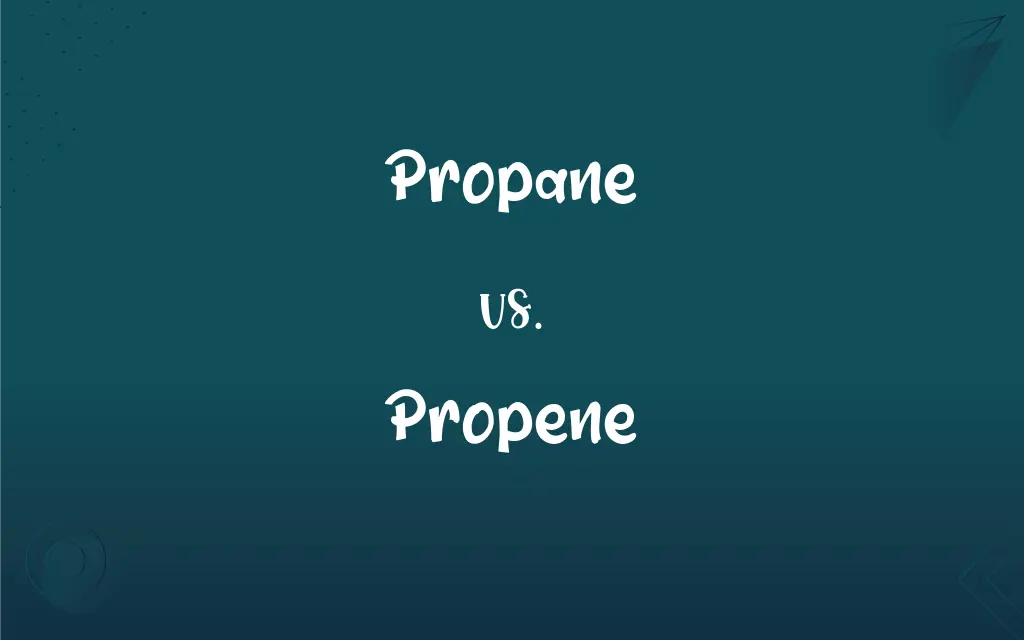Propane vs. Propene: What's the Difference?
Edited by Aimie Carlson || By Harlon Moss || Updated on October 13, 2023
Propane is a saturated, three-carbon alkane (C3H8) used as fuel, while propene, also a three-carbon hydrocarbon, has a double bond (C3H6) and is often used in polymer production.

Key Differences
Propane, a saturated hydrocarbon, offers stability and is widely used in residential and commercial settings for heating and cooking, presenting it as a commonplace fuel. Conversely, propene bears a double bond in its structure, introducing an element of reactivity that finds its utilitarian value in the industrial sector, specifically in producing polymers.
Within the realm of organic chemistry, propane stands as an alkane, illustrating the nature of single-bonded carbon atoms and thus does not engage readily in addition reactions. Propene, on the other hand, is an alkene and its double bond paves the way for it to readily engage in addition reactions, augmenting its utility in chemical syntheses.
In an industrial landscape, propane is significantly recognized for its role in heating, where its complete combustion releases heat and results in water and carbon dioxide. In contrast, propene does not find its primary usage in burning but is heralded for its role as a monomer in producing polypropylene, a widely-used polymer.
Propane is often extracted from natural gas and crude oil refining in a manner that preserves its saturation and general lack of reactivity, ensuring its safe storage and transport. Propene, while also derived from similar sources, is typically isolated in a way that keeps its double bond intact, securing its reactive potential for industrial application.
Recognizing propane as a fuel that provides cleaner combustion relative to other fossil fuels underlines its ecological note, even as an exhaustible resource. Propene, while not a fuel, underscores its industrial importance in the plastic industry, yet also becomes a point of ecological discussion due to the environmental impact of the polymers it helps produce.
ADVERTISEMENT
Comparison Chart
Chemical Structure
C3H8
C3H6
Type of Hydrocarbon
Alkane
Alkene
Usage
Fuel
Monomer in Polymer Production
Bonding
All Single Bonds
Contains a Double Bond
Reactions
Generally unreactive
Engages readily in addition reactions
ADVERTISEMENT
Propane and Propene Definitions
Propane
Propane is a colorless, odorless, flammable gas used widely as fuel.
We use propane to fuel our barbecue grill during summer cookouts.
Propene
Propene is commonly employed in the chemical industry as a monomer for polymer production.
Polypropylene, a versatile polymer, is synthesized from propene monomers.
Propane
Propane is typically stored and transported in a liquid state inside cylinders or tanks.
Ensure the propane tank is securely closed to prevent leaks during transport.
Propene
Propene can act as a building block for various chemical syntheses.
Propene can be converted into propylene oxide, a key ingredient in polyurethane production.
Propane
Propane finds applications in heating, cooking, and as fuel for engines.
The camper utilized a small propane tank to fuel the portable stove.
Propene
Propene is a hydrocarbon with a double bond between two of its carbon atoms.
Propene is commonly used in the production of polypropylene plastics.
Propane
In propane’s combustion, it generates carbon dioxide and water.
Propane stoves are popular due to their efficient combustion process.
Propene
Propene, an alkene, participates readily in addition reactions due to its double bond.
The double bond in propene allows it to polymerize into polypropylene.
Propane
Propane is an alkane, meaning all its carbon atoms are connected by single bonds.
Propane’s single-bonded carbon atoms categorize it as an alkane.
Propene
Propene is a colorless gas with a faint petroleum-like odor.
Propene, when leaked, can be detected due to its characteristic smell.
Propane
A colorless gas, C3H8, found in natural gas and petroleum and widely used as a fuel.
Propene
See propylene.
Propane
(organic compound) An aliphatic hydrocarbon, C3H8, a constituent of natural gas.
Propene
The organic chemical compound propylene. An alkene which is a colorless gaseous (at room temperature and pressure) hydrocarbon with the chemical formula C3H6.
Propane
A heavy gaseous hydrocarbon, C3H8, of the paraffin series, occurring naturally dissolved in crude petroleum, and also made artificially; - called also propyl hydride.
Propene
Same as Propylene.
Propane
Colorless gas found in natural gas and petroleum; used as a fuel
Propene
A flammable gas obtained by cracking petroleum; used in organic synthesis
FAQs
Is propane a renewable resource?
No, propane is a non-renewable resource, derived from natural gas and crude oil.
What is propane commonly used for?
Propane is commonly used as a fuel for heating, cooking, and engines.
Is propane a gas or a liquid?
Propane is a gas at room temperature but is often stored and transported as a liquid.
What distinguishes propene in chemical structure?
Propene contains a carbon-carbon double bond, categorizing it as an alkene.
What role does propene play in polymer production?
Propene serves as a monomer, polymerizing to form polypropylene.
Is propane safe for indoor use?
Propane can be used indoors with proper ventilation and safety precautions.
What type of reactions does propene typically undergo?
Propene commonly undergoes addition reactions due to its double bond.
What is propane’s chemical formula?
Propane’s chemical formula is C3H8.
Is propane environmentally friendly?
Propane burns cleaner than many fuels but is still a fossil fuel with associated greenhouse gas emissions.
Can propane be used in cars?
Yes, some vehicles are designed or modified to run on propane.
Is propene a liquid or a gas?
Propene is a gas at room temperature.
Can propene be used as a fuel?
While combustible, propene is not commonly used as a fuel due to its valuable role as a chemical building block.
What are the dangers associated with propane?
Propane is flammable and can cause explosions or fires if leaked and ignited.
Is propene dangerous?
Propene is flammable and can be hazardous if proper safety precautions are not taken.
What is the chemical formula for propene?
The chemical formula for propene is C3H6.
Can propene be found in household items?
Propene itself isn't common in households, but polymers made from it, like polypropylene, are found in various products.
How is propane produced?
Propane is produced during natural gas processing and crude oil refining.
Is propene naturally occurring?
Propene can be found in small amounts in nature but is largely produced industrially.
How is propane stored for commercial use?
Propane is typically stored in liquid form in large tanks or cylinders.
What is propene derived from?
Propene is derived from petroleum refining and steam cracking of hydrocarbons.
About Author
Written by
Harlon MossHarlon is a seasoned quality moderator and accomplished content writer for Difference Wiki. An alumnus of the prestigious University of California, he earned his degree in Computer Science. Leveraging his academic background, Harlon brings a meticulous and informed perspective to his work, ensuring content accuracy and excellence.
Edited by
Aimie CarlsonAimie Carlson, holding a master's degree in English literature, is a fervent English language enthusiast. She lends her writing talents to Difference Wiki, a prominent website that specializes in comparisons, offering readers insightful analyses that both captivate and inform.































































